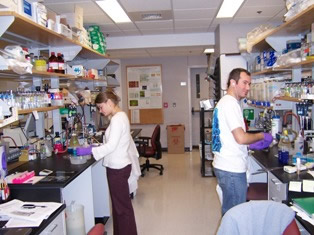After completion of the first and second year course requirements and successful passing of the oral qualifying exam, students continue their training with the following:
 Elective Courses
Elective Courses
Students are required to take four elective courses in their advanced years of training to broaden and deepen their knowledge base. Electives are available which cover a broad range of topics including cell growth control, macromolecular structure and x-ray crystallography, developmental neurogenetics, the biochemistry of membrane carriers, molecular neurobiology, polarity in mammalian cells, molecular mechanisms of signal transduction, membrane biochemistry, immunology, virology and scientific writing. In addition to expanding students’ knowledge, these courses promote close interactions between faculty and students.
Seminars and Journal Clubs
Faculty/student interactions are also provided by many seminars and journal clubs. Students are expected to attend a weekly lab meeting and at least one seminar per week. Departmental seminars usually feature invited outside speakers. Students are also expected to participate in their departmental journal club.
PhD Dissertation and Thesis Seminar
Usually in year five, the student’s thesis committee agrees that the student is nearing completion of his/her research and will be ready to write a dissertation. The student’s research is usually published in one or more scholarly journals prior to the dissertation being written.
The student’s advisor and one other member from their thesis committee will read and approve the dissertation. The student presents a formal and public seminar on his/her completed thesis research to faculty members, postdoctoral fellows and other science trainees prior to submitting their dissertation which completes the degree requirements.
